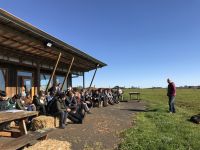
The entire first-year University of Tasmania medical student cohort has been discovering the health issues affecting communities outside the State’s capital.
On Monday, 27 August, 119 aspiring doctors departed Hobart for the North and North-West to commence a Rural Week program.
The residential learning initiative is an annual event, allowing early-years medical students to explore various aspects of rural health.
The group has been working in hospitals, learning about occupational health and safety on farms and practising first-response skills in a bush scenario.
Members of Tasmania’s Aboriginal community have also been working with the students during an on-country visit to Narawntapu National Park.
Dr Lizzi Shires, Director of the University’s Rural Clinical School (RCS), said it was important for students to experience rural health early in their studies.
“Rural communities face different health challenges to their urban counterparts. Farm work has its own unique set of occupational risks. Rural people often suffer poorer health and have additional issues with distant health services,” Dr Shires said.
“Rural Week allows our students to talk to patients and doctors in the rural areas and learn about these rural issues.
“We hope this opportunity allows students to see the many rewarding aspects of a rural placement and encourage them to join us at the RCS in Burnie or Launceston Clinical School in the later years.”
Associate Professor Kim Rooney, Director of the Launceston Clinical School (LCS), said students would be working with their peers who are completing their fourth- and fifth-year of medicine in Burnie and Launceston.
“First-year Rural Week is a great chance for students to visit the LCS and RCS, meet the teaching team and hear the perspective of key community members,” Associate Professor Rooney said.
“Many first-year students will not have visited the North of the State before Rural Week, but in their fourth- and fifth-year more than half will be undertaking their training here or in the North-West.
“We want to introduce students to the opportunities for training in both regions, and also hope to emphasise the importance of understanding the community they will care for and serve.”
Published on: 30 Aug 2018 3:00pm